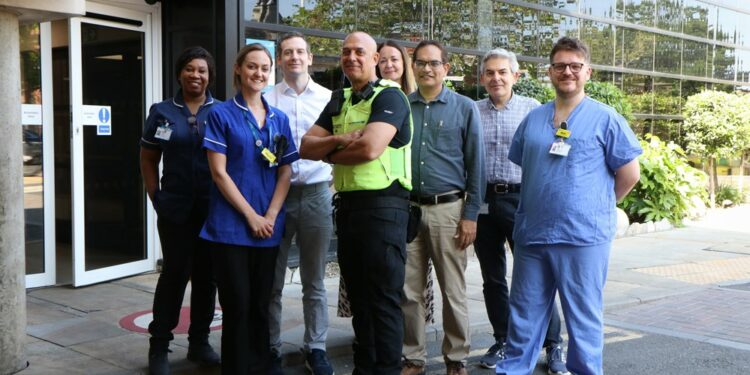Longest-serving hospital security officer makes ‘incredible recovery’ after stroke
England July 17, 2023
A hospital security officer who suffered a stroke has returned to work at King’s College Hospital – marking an “incredible recovery”.
Colleagues feared Carlos Moonsam, 62, from Greenwich, might never return to work. They say it’s “fantastic” to have the hospital’s longest-serving security guard back in the fold.
The Denmark Hill hospital has shared tips on how to recognize and respond to a stroke so people can get the help they need as quickly as possible.
Ian Taylor, Head of Security and Helideck Operations at King’s College Hospital, said: “It is fantastic that Carlos was treated so well and has returned so quickly to the fold, as he has to be one of the kindest and most committed individuals I have known.”
Carlos first became unwell during a shift in May last year. He said: “Out of the blue I suddenly lost my balance, and that’s all I really remember. One moment I was focusing on protecting the staff and patients in the hospital, and the next I was a patient myself in a hospital bed.
“It came as a huge shock to hear I’d had a stroke. Physical fitness is a big part of my job as a security officer, and I train every day. Stroke was not on my radar.”
Doctors carrying out a brain scan noticed a blood clot and Carlos underwent an emergency thrombectomy to surgically remove the blockage and restore blood flow to the brain.
Dr. Naga Kandasamy, Consultant Neuroradiologist at King’s College Hospital, said: “Thrombectomy is an incredible treatment that can save patients’ lives and alleviate the devastating effects a stroke can have.
“Stroke is a medical emergency, and this treatment needs to be given as quickly as possible. The incredible recovery Carlos has made shows the difference it can make. It’s wonderful to see him back at work again.”
The main symptoms of stroke can be remembered with the word FAST:
Face – the face may have dropped on one side, the person may not be able to smile, or their mouth or eye may have dropped.
Arms – the person with suspected stroke may not be able to lift both arms and keep them there because of weakness or numbness in one arm.
Speech – their speech may be slurred or garbled, or the person may not be able to talk at all despite appearing to be awake; they may also have problems understanding what you’re saying to them.
Time – it’s time to dial 911 immediately if you see any of these signs or symptoms.



